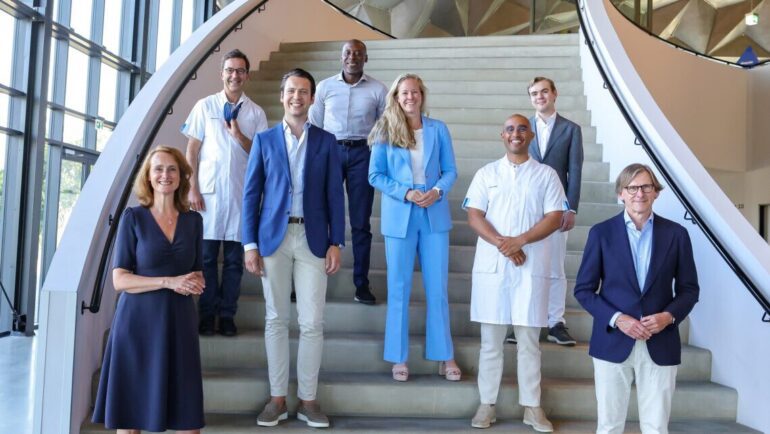TL;DR:
- Erasmus MC and TU Delft have launched the first AI ethics lab for healthcare to address staff shortages and enhance medical care.
- The lab aims to develop ethically sound and clinically relevant AI models that positively impact healthcare and healthcare workers.
- Key challenges include ensuring fairness and clarity of responsibility in AI recommendations.
- The Responsible and Ethical AI in Healthcare Lab (REAiHL) is a collaboration between Erasmus MC, TU Delft, and software company SAS.
- TU Delft will contribute to responsible design and demonstrate the clinical benefits of AI models.
- REAiHL is the 9th lab of the Innovation Center for Artificial Intelligence (ICAI), emphasizing practical outcomes and collaboration.
- The lab will focus on intensive care initially but aims to develop a framework for AI application throughout the hospital.
Main AI News:
As the demand for high-quality medical care intensifies amidst staff shortages, the implementation of artificial intelligence (AI) in healthcare is set to soar in the years to come. In a concerted effort to ensure ethically sound and clinically relevant AI that positively impacts both healthcare services and providers, Erasmus MC and TU Delft have inaugurated the first AI ethics laboratory for healthcare, according to an official statement released by the university.
The adoption of AI in healthcare poses challenging questions, such as whether physicians will feel comfortable discontinuing treatment based on information provided by a computer model. However, alongside these weighty concerns, there is also a myriad of less intense inquiries to address. For instance, can a patient safely be discharged a few days earlier than protocol dictates after a surgical procedure, thereby enhancing the experience for both patient and caregiver? Moreover, an AI assist an ICU nurse in delivering quality care to a greater number of patients?
In order to tackle these quandaries, the underlying AI models supporting physicians in decision-making must provide ethically sound recommendations. Stefan Buijsman, an associate professor of ethics at TU Delft, highlights the World Health Organization’s establishment of six core principles that include clarity of responsibility, fairness, and applicability to each patient. Jeroen van den Hoven, the director of the TU Delft Digital Ethics Centre, has contributed to the formulation of these principles. However, the challenge lies in precisely defining what constitutes fairness in the context of AI models and ensuring its practical implementation.
To address these challenges, the Responsible and Ethical AI in Healthcare Lab (REAiHL) has been established as a collaborative effort between Erasmus MC, TU Delft, and software company SAS. Buijsman explains, “Erasmus MC’s clinical expertise is at the forefront, as they pose the questions and eventually work with the models. At TU Delft, we have been pioneers in digital ethics for two decades, translating ethical values into design requirements for engineers.” Alongside responsible design, TU Delft will play a crucial role in showcasing the clinical benefits of the developed AI models.
REAiHL is an Innovation Center for Artificial Intelligence (ICAI) lab, a research alliance between industrial, governmental, or nonprofit partners and knowledge institutions. ICAI labs must meet stringent requirements in terms of data, expertise, and capacity, and they are expected to translate their findings into practical outcomes. REAiHL represents the 9th ICAI lab in which TU Delft collaborates with partners and other knowledge institutes.
Jacobien Oosterhoff, associate professor of Artificial Intelligence for Healthcare Systems at TU Delft, emphasizes the dual focus of the lab: “On one hand, it involves demonstrating the positive impact on patient care. While we possess extensive knowledge about testing rockets for safe deployment to Mars in remote areas, we still have numerous unresolved questions concerning the safe testing of AI for patient care. On the other hand, it pertains to effectively integrating AI models into the clinical workflow to support doctors and nurses. By bringing together physicians, engineers, nurses, data scientists, and ethicists, we aim to harness a unique synergy.”
The establishment of the AI ethics lab was driven by internist-intensivist Michel van Genderen of Erasmus MC, with the active involvement of Diederik Gommers, professor of Intensive Care Medicine at the institution. Buijsman explains, “Therefore, the initial focus of the new AI ethics lab is to generate best practices for the field of Intensive Care. However, the ultimate objective is to develop a comprehensive framework for the safe and ethical application of AI across the entire hospital. Consequently, we anticipate engaging with use cases from other clinical departments in the near future.”
Conclusion:
The establishment of the AI ethics lab by Erasmus MC and TU Delft signifies a significant step towards leveraging AI in healthcare responsibly. This initiative addresses the pressing challenges of staff shortages and the need for high-quality medical care. With a focus on ethically sound AI models and collaboration between experts from different fields, this development is poised to revolutionize the healthcare market by enabling enhanced patient care and efficient integration of AI into clinical workflows.

